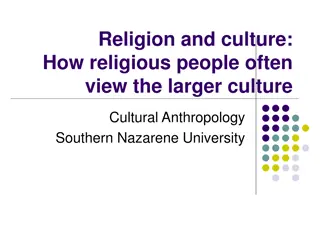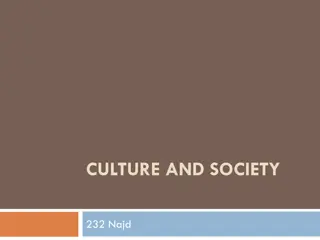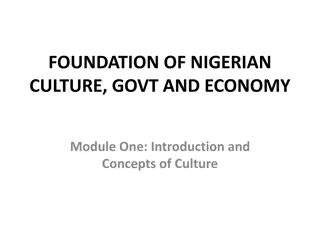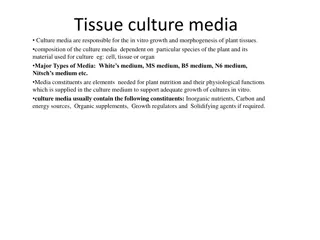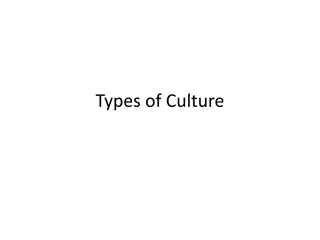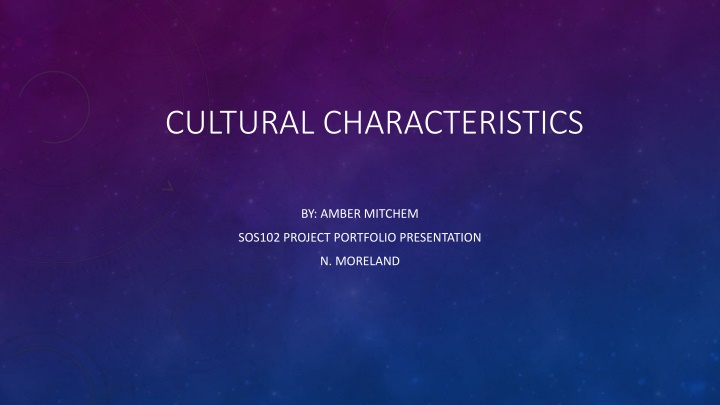
Cultural Characteristics: Relationships, Values, Norms, and Beliefs
Explore the intricate connections between norms, values, culture, and beliefs in society. Learn how cultural needs, attitudes, and practices shape our interactions and perceptions. Enhance your understanding of diverse cultures and their impact on everyday life.
Uploaded on | 1 Views
Download Presentation

Please find below an Image/Link to download the presentation.
The content on the website is provided AS IS for your information and personal use only. It may not be sold, licensed, or shared on other websites without obtaining consent from the author. If you encounter any issues during the download, it is possible that the publisher has removed the file from their server.
You are allowed to download the files provided on this website for personal or commercial use, subject to the condition that they are used lawfully. All files are the property of their respective owners.
The content on the website is provided AS IS for your information and personal use only. It may not be sold, licensed, or shared on other websites without obtaining consent from the author.
E N D
Presentation Transcript
CULTURAL CHARACTERISTICS BY: AMBER MITCHEM SOS102 PROJECT PORTFOLIO PRESENTATION N. MORELAND
INTRODUCTION I will be discussing relationships, values and norms Culture needs, beliefs, and attitudes Mental processing and learning defined by how people organize and process information Work habits and practices
RELATIONSHIPS, VALUES AND NORMS What is the relationship between norms, values, and culture? Norms and values ensure that people behave in socially acceptable ways Norms and value can vary from place to place and over time If we don t have norms and values behavior may become unmanageable and society could fall apart Cultural practices are shared perceptions of how people routinely behave in a culture and values are shared ideals of a culture
CULTURAL NEEDS AND BELIEFS Cultural needs can be influenced by a range of Factors such as where the person lives, their gender and their language. They can include how soon the person would like their funeral, weather they would like to be buried or cremated, and any rituals or ceremonies that are important to them. Beliefs are the tenets or convictions that people hold to be true. Individuals in a society have specific beliefs, but they also share collective values. In contrast, many other cultures are collectivist, meaning the welfare of the group and group relationships are a primary value. The concept of cultural respect has a positive effect on patient care delivery by enabling providers to deliver services that are respectful of and responsive to the health beliefs, practices and cultural and linguistic needs of diverse patients.
CULTURE ATTITUDES Understanding culture and it s attitudes and values towards space, place and nature is a critical aspect in determining appropriate approaches to a wide variety of planning actions. Actions such as gaining support for protected areas, designing new developments, and integrating tourism facilities in existing communities all depend on an understanding of cultural norms and values for success.
CHARACTERISTICS IN CULTURE BEING STUDIED How can some characteristics in culture be studied? Culture has five basic characteristics: it is learned, shared, based on symbols, integrated, and dynamic. All cultures share these basics features. Culture is learned, it is not biological; we do not inherit it. Culture, in this sense, refers to certain personal characteristics of a individual. This is not the sense in which the word culture is used and understood in social sciences. Sometimes culture is used in popular discourse to refer to celebration or an evening of entertainment, as when one speaks of a cultural show.
MENTAL PROCESSING, LEARNING, AND ORGANIZING INFORMATION In the case of mental health, it can impact weather or not yo seek help, what type of help you seek and what support you have around you. You can help address the mental health of minorities by understanding the role culture plays in mental health and by becoming trained to help those around you. Cultural learning is the way a group of people or animals within the society or culture tent to learn and pass on information. Learning styles are greatly influenced by how a culture socializes with its children and young people. Cultural learning is believed to be particularly important for humans. Organizational culture is a system of shared assumptions, values, and beliefs, which governs ho people behave in organizations. Members of organizations makes judgements on the value their organization places on these characteristics and then adjust their behavior to match this perceived set of values.
WORK HABITS AND PRACTICES Among the most common words companies use to describe their culture (and their employees) are talented, driven, dedicated, innovative and ambitious. A good workplace culture provides everyone with the opportunity to initiate change and to grow on a professional and personal aspect. It also promotes openness and encourages your employees to voice their opinions and chase after the values they believe in. A positive culture fosters a sense of employee loyalty. Employees are much more likely to stay with their current employer when they feel they are treated right and enjoy going to work everyday. Employees are much more likely to come together as a team at companies with a strong culture. Culture practice is the manifestation of a culture or sub-culture, especially in regard to the traditional and customary practices of a particular ethical or other cultural group.
CONCLUSION In this presentation I have went over cultural characteristics. The relationships and values and norms And that if we don t have norms and values behavior may become unmanageable and society could fall apart. I talked about culture needs and beliefs, beliefs are the tenets or convictions that people hold to be true. Cultural needs can be influenced by a range of Factors such as where the person lives. I discussed culture attitudes, Understanding culture and it s attitudes and values towards space and designing new developments. I discussed the characteristics in culture being studied. Culture has five basic characteristics: It is learned, shared, based on symbols etc. I also went over Mental processing, learning, and Organizing information. You can help address the mental health of minorities by understanding the role culture plays in mental health and by becoming trained to help those around you. Cultural learning is the way a group of people or animals within the society or culture tent to learn and pass on information. Organizational culture is a system of shared assumptions, values, and beliefs, which governs ho people behave in organizations. Work habits and practices, a positive culture fosters a sense of employee loyalty. Employees are much more likely to stay with their current employer when they feel they are treated right and enjoy going to work everyday. Employees are much more likely to come together as a team at companies with a strong culture.
REFERENCES LGBTQ Cultures: What Health Care Professionals need to know about Sexual and Gender Diversity (Michele J Eliason; Peggy L Chinn Philadelphia: Wolters Kluwer, 2018 English 3rdedition) Culture: A Problem that cannot be solved (Nicholls, C. W. 1988 University of Wisconsin Press.) Culture and Commerce: The Value of Entrepreneurship in Creative Industries (Khaire, Mukti, 280 Stanford University Press 2017) The Role of Culture Values in Treatment (Juarez, 1985; Padilla & Ruiz, 1973, Padilla, Ruiz, & Alvarez, 1975; Sue & Sue, 1987) http://www.forbes.come http://recruiterbox.com > blog articles



